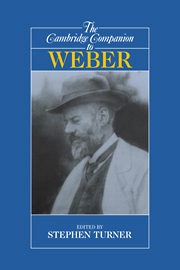Book contents
- Frontmatter
- Introduction
- PART I RATIONALITY, RATIONALIZATION, AND PSYCHOLOGY
- PART II POLITICS AND CULTURE
- 4 The rule of man over man: politics, power and legitimation
- 5 Weber on the cultural situation of the modern age
- 6 Global capitalism and multi-ethnicity: Max Weber then and now
- 7 Constitutional Caesarism: Weber’s politics in their German context
- PART III RELIGIONS AND THEIR ECONOMIC ETHICS
- PART IV LAW AND ECONOMICS
- Further reading
- Index
5 - Weber on the cultural situation of the modern age
from PART II - POLITICS AND CULTURE
Published online by Cambridge University Press: 28 May 2012
- Frontmatter
- Introduction
- PART I RATIONALITY, RATIONALIZATION, AND PSYCHOLOGY
- PART II POLITICS AND CULTURE
- 4 The rule of man over man: politics, power and legitimation
- 5 Weber on the cultural situation of the modern age
- 6 Global capitalism and multi-ethnicity: Max Weber then and now
- 7 Constitutional Caesarism: Weber’s politics in their German context
- PART III RELIGIONS AND THEIR ECONOMIC ETHICS
- PART IV LAW AND ECONOMICS
- Further reading
- Index
Summary
Max Weber's life and work unfolded across one of the decisive turning points in western culture. He experienced the consolidation of modern capitalism, the dynamism of a new urban and technological civilization, and the numerous avant-garde challenges to the inherited cultural traditions of the nineteenth century. He followed the cultural movement of the fin de siècle with interest, even becoming personally entangled with some of its more extreme representatives. His scholarly interests then combined with his personal experience to produce a distinctive body of reflection on the cultural crisis of the times in science, politics, art, economy, ethics, and religion.
Weber's greatest work was always motivated by historical questions bearing on the present, but oriented toward the comparison of world civilizations: “Universal historical problems” and a “universal history of culture,” as he wrote in the introduction to the Collected Essays on the Sociology of Religion (PE 13, 23). His response to the changing cultural milieu took an astonishing variety of forms and was articulated with an historical depth and universal scope rarely matched in scholarship, from complex reflections on the underlying dynamics of the orders of life and value in different societies, to numerous unfinished projects in cultural sociology. Through all of these studies he aimed for a kind of genetic and morphological account of the modern age, an assessment of what Weber himself liked to call “the fate of our times.”
- Type
- Chapter
- Information
- The Cambridge Companion to Weber , pp. 99 - 116Publisher: Cambridge University PressPrint publication year: 2000
- 14
- Cited by

